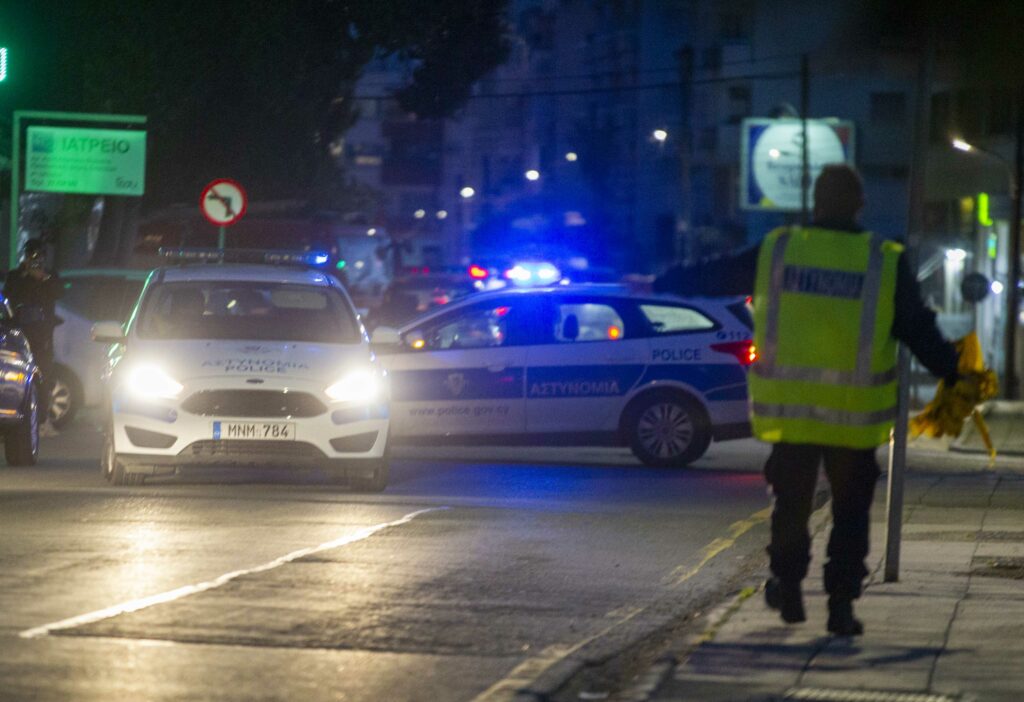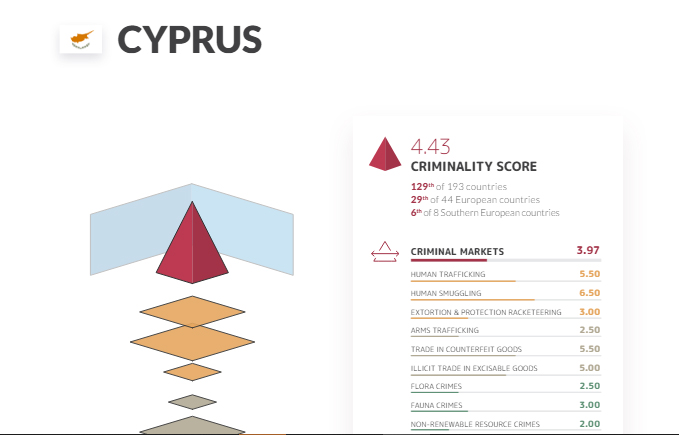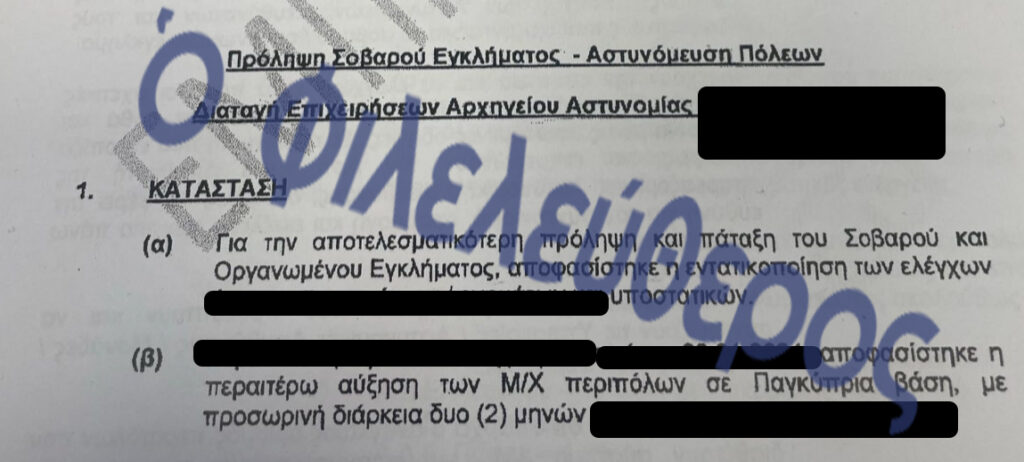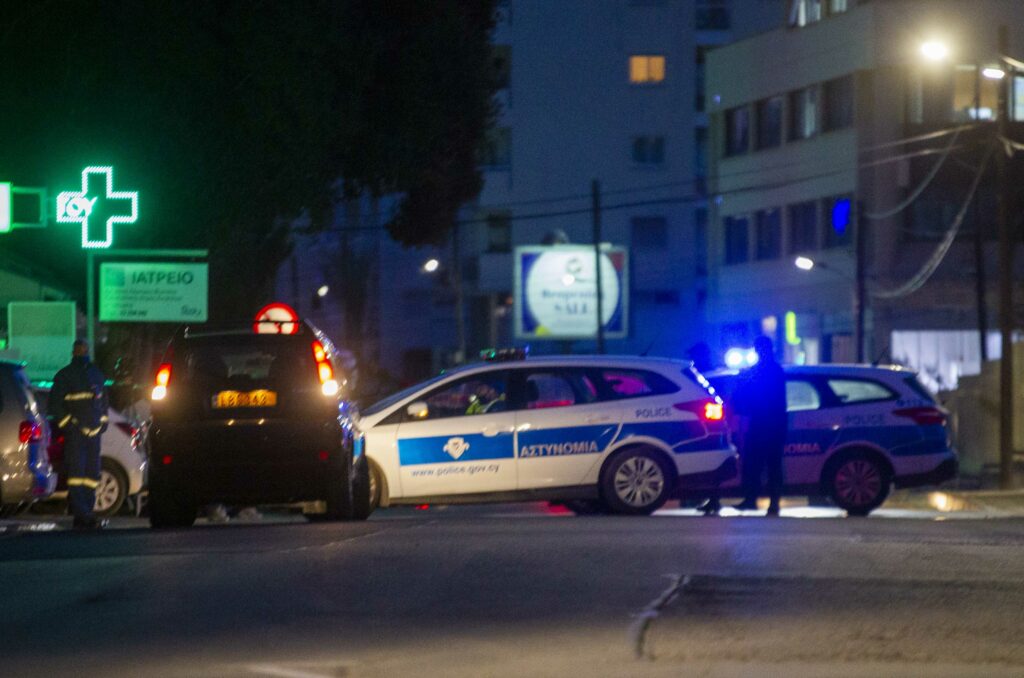Filenews 28 April 2024 - by Fanis Makrides
"Cyprus is home to more than 10 organised criminal groups operating across the country. They are mainly involved in drug trafficking, tobacco smuggling, extortion, illegal betting and match manipulation."
This is a reference for the Republic of Cyprus in the final text of a global survey, conducted over the last four years on the basis of Interpol data and their analysis by experts. It contributes greatly to our journalistic effort to outline crime in Cyprus, following the extreme crime phenomena observed.
The attempted murder that took place last Tuesday (23/4) in broad daylight on a main street in Anthoupoli is not the culmination, but it is a piece of the puzzle, which is compounded by other serious criminal acts in recent months.
Arson, the planting of explosive devices and the execution of murderous plans have painted a picture in recent months, which shows that even if we are not among the countries where crime rates are ringing, we are facing a serious public safety issue.
Criminal acts have taken place very recently at times when civilians are trafficked (one murder and two attempted murders by shooting), i.e. in broad daylight and eyewitnesses, while criminal elements have now turned against justice officials. The recent attacks on public prosecutors, who handle criminal cases on a daily basis, are well known.
Since late last year, reports have indicated that an official of the Republic was targeted for criminal activity by order given from inside the Central Prison.
Fluidity, new teams
All the above actions that we have been experiencing in recent months are attributed to the constant tactics of the underworld, namely the methodology of individuals resorting to illegal actions to promote their interests, but also to a new state of affairs of the last five months.
With regard to this last point, well-informed people, who have knowledge of the facts about organised crime in Cyprus, refer to a fluid situation at the moment as far as night control is concerned. In other words, they speak of a period of great and continuous change.
Since the end of last year, some data have been formed, which have triggered a change in the composition of criminal groups and a general reshaping of the landscape. Changes in top positions of the pyramid, new collaborations between organized criminals, jumping from one camp to another... Thus, former collaborators are now rivals and vice versa. At the center of the frame, financial interests from illegal activities.
People with expertise in organised crime can be expected to see clean-up. Which, in this case, as is strongly commented, take place even in broad daylight, even if citizens or persons who have nothing to do with their affairs are endangered.
"It was a boiling cauldron and just waiting for the initial explosion, which may be followed by others," a person with knowledge of events and situations told F. The same person referred us to the summer period, which is directly linked to financial interests from illegal activities.

The form of crime
But what is the general picture of crime in Cyprus? Answers are given through the Global Crime Index. It is prepared every two years by experts. The project, the results of which we saw for the first time in 2021 with the publication of the first report, involves the European Union-funded organization ENACT, which is supported by Interpol and cooperates with the Global Initiative against Transnational Crime.
The latter, often referred to as the 'global initiative', is an international non-governmental organisation headquartered in Geneva. It consists of a network of law enforcement, governance and development professionals whose mission is to develop innovative strategies and responses to organized crime (doctorates, professors, etc.). In July 2020, the network counted 500 experts. The whole project is financially supported by the European Union, but also by the USA (Ministry of Foreign Affairs). Norway also makes an economic contribution.
In the second report on the Global Crime Index released last winter (11/2023), the analysis for Cyprus is interesting. Apart from the report on the double-digit number of groups operating in the Republic of Cyprus and their main occupation (drug trafficking, tobacco smuggling, extortion, illegal betting and match manipulation), many other details are provided.

"Extortion activity by organised criminal groups is widespread in nightclubs, particularly in popular tourist locations, not only in coastal areas but also inland," it said.
The largest form of crime is related to immigration. It is reported that due to the geographical position of Cyprus, "irregular" immigration and related offences by traffickers of human souls are on the rise. This type of crime is No1 in Cyprus and is followed by drug trafficking and human trafficking.
Regarding the profile of members of criminal groups, it is noted: "Foreign criminal actors are protagonists in Cyprus and their participation in the country's criminal markets remains problematic. Organised crime groups from the Caucasus, Eastern Europe and Asia are heavily involved in property crimes as well as money laundering and dominate the drug trafficking market in the occupied territories.
In areas that are not under the effective control of the Republic of Cyprus, there are several people sought by INTERPOL. These foreign criminal actors work closely with domestic criminals. Criminal networks have a large influence in the country and have a share of the drug trafficking market, as well as illegal gambling, trafficking in women and property crimes. In addition, there is evidence that the local private sector has engaged in organised crime activities, usually by bribing officials (such as from companies involved in procurement cases) or by defrauding the government."
The cocaine trade
The report provides important data on how the situation in the occupied areas favours the development of illegal activities. However, much of the analysis on crime is devoted to drug trafficking, which along with immigration and human trafficking are the biggest problems on our island, as noted by experts. Particular mention is made of the cocaine trade, which is described as "one of the largest criminal commercial networks in Cyprus".
We present unaltered reports:
>> «The heroin trade in Cyprus is limited and mainly intended for the domestic market, with only a few small seizures reported. Most of the imported heroin is trafficked from Afghanistan via sea routes, taking advantage of the instability in the occupied territories. However, Turkey's role as a transit and increasing consumption in neighbouring countries are worrying factors likely to affect the heroin market in Cyprus, especially in the occupied part of the island. The cocaine trade is one of the largest criminal trade networks in Cyprus."
>> From Latin America and the Netherlands: 'Driven by international customers, cocaine mainly enters the country on passenger flights or air transport from Latin America, Belgium or the Netherlands. Although local cocaine use is low, the highest levels are found in the tourist areas of Ayia Napa and Paralimni. The criminal actors involved in the trade are mostly well-established Cypriot groups, but they also cooperate with other nationalities."
>> "They receive bribes": "The cocaine trade in Cyprus involves the use of legal channels, the owners of which are either directly involved or receive bribes to allow organized criminal groups to operate under the radar. They often use middlemen, including people with financial problems, who are paid to receive and transport packages of cocaine. The use of cannabis by Cypriots increased during the COVID-19 lockdown, a trend that continued in the post-pandemic period. It is easily accessible and popular among both locals and tourists. Due to the high demand, most cannabis in Cyprus is imported from Europe through networks of Cypriot citizens. Limassol is the main port of entry for cannabis into Cyprus, which is often hidden in containers on ships. Local cultivation takes place mainly in mountainous areas and near foreign military bases, where police presence is limited."

Police actions and policy to tackle organized crime
- Data from January until today on the actions of the prosecuting authorities
Since the beginning of January (8/1/2024), when the Minister of Justice, Marios Hartsiotis took office, crime was one of the problems he would inevitably face for good. This was preceded by events indicating developments in the activities of criminal groups, and there were also attacks on justice officials. The reason for the serious bombing of a public prosecutor's house in December (before the new minister took over) and the arson of the property of a colleague of the latter on January 16. There were immediate actions on his part, as part of his duties as political boss. Besides, in his own statements, he acknowledged the problem and spoke about measures taken by the Police. It should be noted here that Mr. Hartsiotis emphasizes at every opportunity that the ministry he heads exercises supervision, clarifying that the operational part belongs to the Police.
Since Mr. Hartsiotis took office, the actions taken by the leadership of the Police, based on facts, official positions, information and our publications, are the following:
>> Since 23 January, specific measures have been taken to prevent and combat serious and organised crime. They were not made public.
>> In early February, according to our report, all police officers involved in search warrants were instructed how to act when seizing suspects' mobile phones. The issue related to suspects' methods aimed at preventing police from extracting data from their mobile phones and making forensic copies.
>> As "F" had revealed again, in mid-February there were explicit orders from the Chief of Police, Stelios Papatheodorou, for members of the Police to increase surveillance and control measures during transfers of prison inmates to and from the Courts. It was observed that prisoners managed to bring drugs and prohibited items, such as telephones, to the prison. The minister, responding to a question on a Sigma news programme a few days later, had clarified that these instructions were given following his own recommendations.
>> On March 20, instructions were given by the operations office of the Police Headquarters to prevent and combat serious organized crime. Specifically, a plan was drawn up to increase motorized patrols on a nationwide basis. As "F" revealed, this is a two-month operation that began on 22/3 and provides for the participation of about 90 patrols and 190 members of the Police with the aim of covering 36 geographical areas all over Cyprus daily, from the evening until the morning of the next day.
>> The Police are now very sparing when it comes to reporting on criminal acts. For some events it did not give information, while for others it informed deferred. Mr. Hartsiotis, in a question submitted to him (20/4) by the journalist of "F", Ioanna Mantzipas, replied that some events "are prioritized as serious for internal order and security, they should not come out".
>> In mid-April the Police had an active role in an ongoing operation on migration, which according to the Global Crime Index is the most serious crime in Cyprus. He participated with Port and Maritime Police vessels in international waters and specifically off the coast of Lebanon, to prevent migratory flows. Five boats carrying hundreds of irregular migrants, bound for Cyprus, were prevented and arrived safely (as officially reported) in Lebanon. The operation continued in the following days, with no further incident recorded at the time of writing.
>> According to data provided to us by the Police at our request for the needs of this report and the field of illegal immigration, from the beginning of 2024 until 16/4 the Police Force examined 37 cases and arrested 44 persons on suspicion of trafficking. In March 2024, it also examined 120 cases of illegal employment, involving 119 employers and 155 employees.
>> Regarding cases of organized crime, the Police – according to official data – made 20 arrests in March for 12 different cases of arson of buildings or vehicles on a nationwide basis. From the beginning of April until the 25th of the month, there were 6 arrests in 12 cases. Among those cases later this month is an arrest for attempting to destroy property with explosives. According to information in our newspaper, this is the case concerning the Nava nightclub in Free Famagusta.
>> The appointment of new persons (23/4) to the positions of heads of the Information Management and Analysis Service (YDAP) and the Nicosia Crime Detection Department (ICF), respectively, is attributed to the intensification of efforts to prevent and combat organized crime.

CENTRAL PRISON
Hartsiotis meeting for deactivation system
- Locating a cell phone in a prisoner's cell employed for serious cases
The problem with Central Prisons and the documented – through court decisions – organization of crimes through cells continues to be of great concern. The mobile phone deactivation system was a point of contention even between former Justice Minister Stefi Drakou and the then director of the penitentiary, Anna Aristotelous.
The latter raised the issue of constitutional rights of residents in case of full utilization of the software, for geolocation of devices within prisons. There is now a pending lawsuit between the State and the company that had undertaken the implementation of the project. Nevertheless, efforts are being made to resolve the issue. In fact, our information indicates that last Tuesday the Minister of Justice had a meeting with the Minister of Transport Alexis Vafeadis and representatives of other competent services in order to speed up the procedures for the new tender with the aim of operating a reliable system. Based on the data, it is estimated that the installation will be implemented in 12 months.
However, it is a given that the Prison Administration now has good cooperation with the Police, whatever that means. This is because the management was undertaken by police officers. We remind you that initially Mrs. Aristotelous was replaced by Ioannis Kapnoullas (January 2023), who was succeeded on 10/2/2024 by Superintendent A', Charalambos Filippidis. Search warrants in prisoner cells are now being executed immediately. In recent months, four prison staff members have been suspended. Last Wednesday, proceedings were initiated against a female prison guard, who is suspected of transferring a mobile phone to the prison. Last Tuesday, a telephone was found in a cell of a person who engaged authorities in serious cases.
THE EXUBERANCE WITH NUMBERS THAT COMES OUT OF THE REPORT
The increase in crime in the first months of 2024 is attributed through figures recorded in journalistic reports. ANT1 on 26/3 reported that 47 arsons were recorded in 86 days, referring to one arson every two 24 hours. In the same report, he said the corresponding number of bombings for the same point in time was 11.
The website reporter in a detailed report on April 12 concluded that "in 101 days there were 55 arsons and bombings." The report noted that "every 44 hours, there is either an arson or a bomb explosion, which is an extremely high number by standards."
The president of the trade union "Equality", Nikos Loizides, spoke to CyBC after 10 days of 84 criminal acts since the beginning of the year, taking into account the crimes that followed, but also obviously taking into account that the arson at a vehicle repair shop in Kaimakli is equivalent to 17 separate cases (an equal number of vehicles were destroyed).
Officially, the police have not commented on these figures, and had not issued press releases on most organized crime cases.
ASSASSINATIONS AND ATTEMPTS FROM LATE 2023
On 30/10/2023, 55-year-old Thanasis Kalogeropoulos was murdered in Germasogeia. He was ambushed by two people on the morning of that day, shooting him with a pistol and an automatic military rifle, respectively. Four people have been charged with planning and executing the murder.
On 31/10/2023, 45-year-old Alexis Mavromichalis was murdered with a gunshot while on the balcony of an apartment on Verenikis Street in Acropolis.
On 15/1/2024, early in the afternoon, an attempted murder took place in Aglantzia. An unknown person opened fire on a 49-year-old man while he was in the vehicle with his two children.
Early in the afternoon of April 23 in Anthoupoli, a person who was a passenger on a scooter fired three shots at Dimitris Andronikou ("Dimitroui"), who was riding his large displacement motorcycle.
